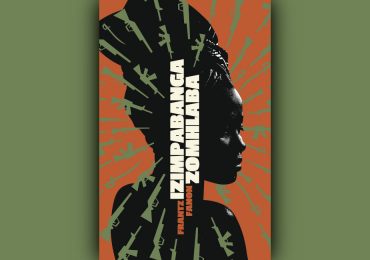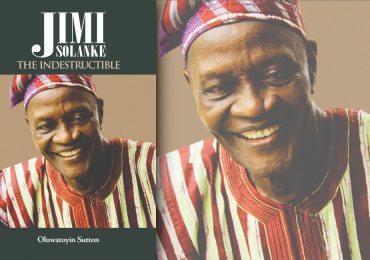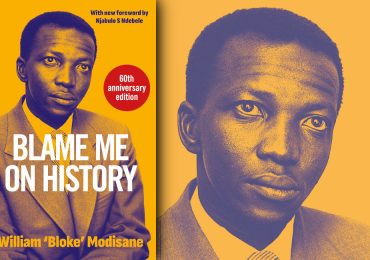Sandile Ngidi reflects on the life and work of Zulu novelist, poet, scholar, teacher and editor Sibusiso Nyembezi (1919–2000).
In 2019, we celebrate the centenary of the birth of Sibusiso Nyembezi, whose life was a remarkable odyssey of passion for Zulu heritage, history and craft—and for the flourishing of ideas that occured within the vibrant spaces wherever Zulus lived. His project was a subtle but bold attempt at upsetting the colonial centre, which had brutally displaced Zulu language and culture to the periphery, a jungle that relegated a vast and diverse indigenous orature to children of a lesser God.
For more than fifty years, like a milk-endowed cow Nyembezi was a literary and cultural udder from which generations of isiZulu and other Nguni language readers sucked tremendous knowledge—knowledge that went beyond the intellectual to affirm their basic humanity. In him Africa has a writer whose entire intellectual vision epitomises Wole Soyinka’s assertion that ‘a people who do not preserve their memory are a people who have forfeited their history’. Nyembezi fought against the abandonment of his people’s heritage and knowledge systems, putting to optimal use the key tool of modernity, writing, to give voice to the wretched of the earth.
Inqolobane Yesizwe—‘the storehouse of the nation’—is a title befitting Nyembezi. It’s also the title of an authoritative and bestselling reference book on critical aspects of Zulu culture, written by Nyembezi and Otty Ezrom Howard Mandlakayise Nxumalo. First published in 1966 by Shuter and Shooter, in the book’s introduction the authors commit to the preservation of the treasure chest of knowledge from the Zulu cultural and linguistic world, for the benefit of current and future generations. Today a leading poet and retired university professor, Nxumalo was only twenty-eight years old when the book came out, and says Nyembezi was a great mentor. Like the Oxford English Dictionary, Inqolobane was a compulsory textbook for the entirety of my high school education in the mid-nineteen-eighties.
Born in 1919 in Babanango near Eshowe in northern KwaZulu-Natal, Cyril Lincoln Sibusiso Nyembezi was educated by missionaries prior to embarking on his university education at the University of South Africa and the University of the Witwatersrand. He was a product of, among others, the famous Catholic boarding school St Francis’ College in Mariannhill, Durban—also the alma mater of the pioneering Zulu poet BW Vilakazi. In 1935, Vilakazi became the first poet to publish a collection of Zulu poems, Inkondlo kaZulu, which he followed with an accomplished second collection, Amal’ezulu, in 1944. In the introduction to his seminal work Izibongo Zamakhosi, a critical study of the traditional poetry in honour of select Zulu and Swazi kings, Nyembezi writes that he received enormous encouragement from Vilakazi, then at Wits. The two academics, Vilakazi and Nyembezi, committed chroniclers of Zulu culture in its vast and varied forms, seemed to have had much in common; and had Vilakazi lived longer, I have no doubt their joint impact as scholars, already so significant, would yet have been much larger.
‘In our discussions with the late Dr BW Vilakazi it soon emerged that he too had been concerned about the need for a study on various aspects of oral traditional poetry in honour of Zulu kings. When he heard that I too was keen on this study, he was most pleased and encouraging,’ said leading Swazi writer and scholar JSM Matsebula, who also played a major role in Nyembezi’s research. (Incidentally, Matsebula is one of the poets to have indirectly made me try my hand in poetry at high school.)
In 1946 Nyembezi embarked on his groundbreaking fieldwork for Izibongo Zamakhosi, travelling mostly on bicycle through what was then northern Zululand. One visit almost turned nasty when, clad in a heavy overcoat and a hat, he was mistaken for a hired assassin and met by his interviewee’s wife at the gate, heavily interrogated, and summarily dismissed. Izibongo Zamakhosi succeeds in its stated purpose of critically analysing the deep and often ambiguous meanings of words in this form of oral poetry. The author shows a critical grasp of the craft and its various practices, such as repetition and the deliberate passing of salutations and other poetic lines from one king to the next. Nyembezi also posits that poets of the Zulu and Swazi royal courts had a license to be discerning and caustic critics of a reigning monarch, often openly mocking arrogance and other foolish traits that threatened the peace. His book affords many insights into social history, myth-making and identity politics among Zulus.
It is thanks to interventions such as Nyembezi’s that, today, sharp literary scholars are loathe to attach the misleading and demeaning term ‘praise poetry’ to this highly imaginative, nuanced, complex and rhetorically powerful poetic form. Mazisi Kunene makes the point succinctly in the introduction to his epic poem Emperor Shaka the Great: ‘Poems of excellence are so designated because of their social strategy—namely that of elevating highest desirable qualities in society. They have been wrongly described as praise poems. However, they do more than praise and are more complex.’
In 1948 Nyembezi succeeded the doyen of Nguni letters, Vilakazi, as a lecturer of isiXhosa and isiZulu in the Department of Bantu Studies at the University of the Witwatersrand. Vilakazi had suddenly died, on 26 October 1947, following a brief illness. A baobab had fallen—African literature had, in a flash, lost one of its brightest and best. For the trailblazing yet small and fragile black intellectual set that Ntongela Masilela has dubbed the New African Movement, Vilakazi’s death felt like its collective skull had been split wide open. It is tempting to see the tragedy as a defining moment for Nyembezi—a major reason he stuck to his proverbial spears, rising to become an indomitable force in African literature, in defiance of the violent political regime that did its utmost to hold him back. Perhaps he withstood it all not just out of a stubborn personal passion for Zulu literature, history and cultural heritage, but also as a tribute to his beloved mentor and the father of modern Zulu literature, Benedict Wallet Vilakazi.
Nyembezi, who then represents the second generation in imaginative Zulu writing of the twentieth and twenty-first centuries, had previously obtained a BA from the University of South Africa in 1946 and a BA Honours from the University of the Witwatersrand in 1947. He received an MA from the same institution in 1954, and was appointed as a lecturer at the University College of Fort Hare in 1955. From this institution he resigned in 1959, in protest against the introduction of Bantu Education (a system meant to accelerate the apartheid state’s agenda to deliberately make the education of black people inferior to that of the ‘superior’ whites, thereby stifling their intellectual and material growth), and began his lifelong career in publishing, in the main, for the school market.
Insengwakazi, a Zulu term of endearment for a cow that never tires of producing large amounts of quality milk, is another title befitting Nyembezi, as I have alluded. He steadfastly withstood the harshness of the seasons and the truant currents that characterised his times. And his writing, multidimensional as it was, never lost its critical ingredient: enduring wry portraits of the human condition. Nyembezi stood as a principled and consistent witness to his times—a lonesome and astonishingly calm voice, even as the dark hour tempted one to tear one’s flesh raw.
In 1950 Nyembezi published his debut novel, Mntanami! Mntanami! (My Child! My Child), followed in 1953 by Ubudoda Abukhulelwa (One Does Not Have to be Old to do Manly Deeds). The latter is the first and only Nyembezi novel I read at school. His restless pen was so bountiful, however, that by the late-nineteen-sixties he had written and published more than ten books. These included the isiZulu translation of Alan Paton’s Cry the Beloved Country, Lafa’elihle Kakhulu, in 1958, and the classic Inkinsela yaseMgungundlovu (The Rich Man of Pietermaritzburg) in 1961.
The period was a season of rich harvest for African literature. New and fierce voices were rising, armed to the teeth with what Chinua Achebe described as ‘new ways to write about Africa’. The founding of the literary journal Black Orpheus in 1957, and two major African literary and arts conferences—at Makerere University in Uganda in 1962 and in Dakar and Freetown in 1963—were great occasions for loving and celebrating African literature and arts. The period also produced names that would lead the pack of literary critics in the decades to follow, including Lewis Nkosi, Ulli Beier, Abiola Irele, Es’kia Mphahlele, Martin Esslin, Gerald Moore and Donatus Nwoga. Meanwhile, at home, with very few exceptions, hardly any indigenous language critic of major consequence emerged from this bountiful era. For instance, had Nkosi invested time in analysing literature in Zulu—his mother tongue—I doubt his attacks on fellow black South African writers, most notably in his 1965 essay ‘Fiction by Black South Africans’, would have been so severe.
Outside South Africa, there was a great sense that African literature was heading in the right direction. ‘There was already in the works a startling concoction from the pen of a Nigerian coppersmith, Amos Tutuola, which Faber would publish in 1952,’ writes Achebe in his 2000 work Home and Exile (the same title, incidentally, that Nkosi chose for the collection of essays, published thirty-five years prior, that housed ‘Fiction by Black South Africans’). At the heart of these new voices was a common commitment towards ‘reinvesting the continent and its people with humanity, free at last of those stock situations and stock characters, “never completely human,” that had dominated European writing about Africa for hundreds of years’. In the list of names that Achebe rattles off to celebrate this golden era, Sibusiso Nyembezi is a glaring omission. Not because one finds fault or deliberate mischief on Achebe’s part, but rather because of a genuine desire to see Nyembezi’s story help us depart the poisoned shores of so-called South African literary provincialism, sailing further, eager to discover new oceans.
Nyembezi wrote and published for the better part of his career in the vortex of oppression that the Nationalist Party, having taken power in 1948, maintained and grew with an almost salacious zeal. The apartheid state not only legally oppressed black people, but also bitterly abused their languages as part of the system’s divide and rule agenda. It made ethnic chauvinism and mistrust among blacks an integral part of our overall psyche and identity. Consequently, even progressive literary scholars tended to frown upon indigenous language literature, erroneously homogenising it, convinced it was intrinsically of an inferior artistic quality and simply an oppressor’s propaganda tool. It was partly this attitude that marginalised the likes of Nyembezi in the serious and influential circles of African literary production and scholarship, notwithstanding his voluminous body of work over an extended period. And it is for this reason that the intervention of Zulu literary scholars, including DBZ Ntuli, Nhlanhla Mathonsi and Nompumelelo Zondi, is so important, for they have demonstrated that there were indeed writers whose work reflected social commitment, a struggle waged in the dead of the literary and linguistic night as a means of eluding the censorship laws of the apartheid state.
My enormous admiration for Nyembezi is also a story of childhood fantasies and joyful memories. Nyembezi is the only author in any language whom I read at lower primary school whose name I never forgot. Period. Not because I had dreamt of becoming a writer myself at that stage—let alone translating the iconic Inkinsela YaseMgungundlovu into English, which I eventually had the honour of doing, and which appeared as The Rich Man of Pietermaritzburg in 2008. No, the sheer beauty of Nyembezi’s Igoda, a captivating isiZulu reader series, was the cause of my lifelong love and respect for his writing. The book’s enchanting prose, coupled with evocative sketches by the legendary George Pemba, remain vivid and heartwarming. It is thanks to writers like Nyembezi that I can safely say my early school years were epic festivals of storytelling and joyous dances of the imagination. For in the Igoda series, Nyembezi writes unforgettably delightful tales that humanise black lives. Littered with crisp, easy-going, two-line and three-line sentences, Igoda is replete with memorable and colourful jewels of language that testify to the author’s elegant mastery of his craft. Leading characters in Igoda, such as Nana and Fana, remain etched in my imagination, the same way Snow White and Pippi Longstocking last forever in the mind of a child who grew up on a diet of Western fairy tales.
This invocation of childhood is, of course, both joyous and traumatic. The joy tells of how much I loved Nyembezi’s work, while the trauma tells of great loss, of the erasure of a writer of such distinction from the mainstream of African letters, and of a persistent sense that a requiem is long overdue. In the year of Nyembezi’s one-hundredth birthday, questions abound as to why this colossus does not enjoy the prominence of his literary peers. I refer specifically to African writers who became household names from the nineteen-fifties onwards—iconic writers including Tutuola, Mphahlele, Achebe, Nadine Gordimer, Soyinka, Cyprian Ekwensi and Ngũgĩ wa Thiong’o. Linked to this question is a call for increased critical literary dialogue in indigenous languages—not just in isiZulu, but in all indigenous languages, a concern that has been raised by leading African literary scholars for years.
I wish to discuss Nyembezi’s The Rich Man of Pietermaritzburg briefly. In 2000, thanks to the efforts of the writer and scholar Njabulo Ndebele, the novel was selected for a list of the one hundred best African books of the last century, as part of an initiative by the late, renowned Kenyan historian Ali Mazrui. The fact of its selection as one of these ‘100 best books’ was a major consideration for Aflame Books, a United Kingdom-based publisher with South African links, in publishing my translation in 2008. For me, the translation counted as an opportune moment to contribute to properly situating Nyembezi’s significance in African literature. The labyrinthine politics of literary representation in Africa greatly concern me. Not because I dream of a Nietzschean dance around a shrine created in the persona of Sibusiso Nyembezi; and not, as Salman Rushdie says sardonically, because I hope to find ‘gnarled growths sprouting through the soles’ of my feet; but because I understand the curse of Caliban, and like CLR James, Mazisi Kunene, wa Thiong’o and George Lamming I am unapologetically anti-colonial. I believe it is right to rebel against Prospero.
The spatial turn in Inkinsela YaseMgungundlovu is one of the many effects underlying the novel’s charm. From the very first line, and for almost three pages, the reader is treated to a picturesque portrayal of the times, and the slow, often repetitive rhythm of the Zululand countryside. It’s a rapidly industrialising yet unequal and poverty stricken world: we’re at the beginning of the end of the proverbial age of innocence. The novel is set in the greater Vryheid area in KwaZulu-Natal, where my late twin brother Nkosinathi and my elder brother Thami and I were born (it’s as if my Nyembezi mission is the call of the navel!). At the time, my parents were teachers in the area, migrant labourers of a special social robe.
Nyembezi opens the novel like a piece of travel writing from the pages of Granta magazine:
Nyanyandu in northern Natal is an old place, a pretty famous place in fact. The name of the place is taken from that of the enchanting Nyanyadu Mountain nearby. If you are travelling to this place, either from Durban in the south or Johannesburg in the north, the best route to take is one that goes straight to the town of Dundee. In this town you would board the bus to Nyanyadu that goes once a day—on Sundays there is no bus at all. The bus leaves Dundee at lunchtime, zigzags through the white suburbs until it exits the town. Then you will see it blowing up the winds beside the legendary Mpathe Mountain which is believed to harbour money left by ghosts at its summit. It will keep on travelling, stopping only to let some passengers alight. Some would have come by buses from Msinga. Many would have come to town by bus to do their grocery shopping and various errands. Now, everyone is on the way home. The bus keeps on picking some up along the way. It carries on until it reaches the black township of Longlands. When it leaves Longlands it is already on its way to its depot at Ngisana store.
In November 2019, Shuter and Shooter will publish a slightly revised edition of my translation. Colours to the mast: I hate the new cowhide cover the publishers are adamant is appropriate, and without having offered any other creative options for consideration. Incredible! Despite this personal and principled upset, I am pleased to have a chance, again, to pay tribute to this doyen of African letters. The republication is a timely salute to someone whose abiding legacy lies in his subversive grit to diligently cultivate his patch, nursing it until it became the life-giving forest of timeless treasures it is today.
Siyabonga Shamase!
- Sandile Ngidi is a poet, playwright, newspaper columnist and literary critic. In 2008 he translated Sibusiso Nyembezi’s classic Zulu novel Inkinsela yaseMgungundlovu into English, as The Rich Man of Pietermaritzburg. Follow him on Twitter.





